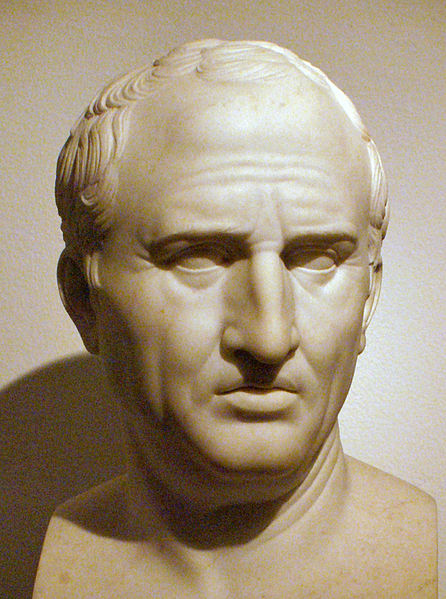
Cicero’s Stoic Paradoxes
The Stoic Paradoxes is a short work written ‘during these shorter nights’ of the year 46BC. The work is comprised of six essays addressed to Marcus Brutus.
In the short introduction of the work Cicero’s reasons are given for writing the essays:
“I have, for amusement, digested into common-places those topics which the Stoics scarcely prove in their retirement and in their schools. Such topics are termed, even by themselves, paradoxes, because they are remarkable, and contrary to the opinion of all men”
Cicero was a man indifferent to the disagreements or the ‘raillery’ of the masses. The ad-populum fallacy will not catch the mighty Cicero out! As the man says:
“Now let any man indulge his raillery, if he please; but right reason will ever have more weight with me than the opinion of the multitude”
I write this as a series of commentaries giving my thoughts on Cicero’s reflections on each individual paradox. The translations of these Stoic Paradoxes was done by a C.R. Edmonds and from now on the rest of this article will be concerned with the first paradox.
Paradox 1 – That Virtue Is The Only Good
On ‘good and desirable things’
Cicero opens with his opinion about coveting luxury, which would be equivalent if you will to the rat race of our modern times. He discounted himself as one of the many that thought luxury and pleasures are the chief good so he says here:
“By Hercules, I never was one who reckoned among good and desirable things, treasures, magnificent mansions, interest, power, or those pleasures to which mankind are most chiefly addicted “
On these ‘good and desirable things’ Cicero then goes on to say:
“For I have observed, that those to whom these things abounded, still desired them most: for the thirst of cupidity is never filled or satiated. They are tormented not only with the lust of increasing but with the fear of losing what they have.”
It had to be noted here though that Cicero himself was a man who possessed much of that ‘good and desirable things’ he was wealthy, possessed multiple villas and marble statues, which he mentioned in one of his letters corresponding with his friend Atticus. He of all people knew about coveting riches and stashing them in his many villas and so must have rightly known that the craving for new luxuries and fashions are insatiable.
Reading this I’m reminded of Schopenhauer’s comment on the individual as condemned in a state of ‘continual desire without satisfaction’ but of course this was known by the stoics thousands of years before.
Luxuries once in our possession can give us only temporary satisfaction, but even that state of satisfaction can only be achieved if peace of mind is a prerequisite factor. So reflect on this, would an individual suffering clinical depression gain greater satisfaction from getting a pay rise or say, being gifted with a 50inch ultra HD TV compared to another individual without a mental health problem receiving the same things?
Can the possession of wealth make one virtuous?
Cicero made an additional observation:
“Can any bad man enjoy a good thing? or, is it possible for a man not to be good, when he lives in the very abundance of good things? And yet we see all those things so distributed that wicked men possess them, and that they are inauspicious to the good”
From this passage I cannot help but think of Marcus Licinius Crassus, the richest man of his time in ancient Rome who profited from the misfortunes of others. Here are some examples: Crassus acquiring the properties of Sulla’s victims which were cheaply auctioned off, being Infamously known about Rome to take advantage of buying burnt and collapsed buildings when their property values plummeted only to rebuild them again with slave labour and this next one, how impious, he befriended a priestess named Licinia, just in order to covet her property. I have not much else to say for this passage other than I understand the sentiment in which Cicero is coming from.
Bias of Priene
Cicero spoke highly of Bias of Priene, one of the seven sages of ancient Greece. Bias, during the sacking of his native Priene, did not even bother to take any of his material possessions with him while fleeing the city. Telling another person the reason why he did this he said: “for I carry with me all my possessions”. Think of a similar scenario in which possessions are destroyed such as in the event of a natural disaster like an earthquake. In a scenario like this I say that either we risk saving some of the movable property we possess with our life/health on the roulette or be safe and stomach the loss of property while adopting this virtuous state of mind. This virtuous state of mind is of course an ideal, it is something to strive for should misfortune find us. So would the latter action, Bias’ action and temperament, be recommended? especially if we do not have any other approach to this situation?
‘what then is a real good’
After praising Bias, Cicero then goes on to illustrate the pros of virtue by the lives and actions of Rome’s greatest men. He finally defines the ‘what then is a real good?’ His answer:
“Whatever is done uprightly, honestly, and virtuously, is truly said to be done well; and whatever is upright, honest and agreeable to virtue, that alone, as I think, is a good thing.”…”By what steps then did Romulus ascend to heaven? By those which these people term good things? Or by his exploits and his virtues?”
Our Cicero goes on to praise many other men that came after Romulus most prominently Publius and Gneius Scipio who, at risk of their own lives, campaigned to fight the Carthaginians. By their deeds did it make them glorious and noble or in short virtuous.
Conclusion – what is more praiseworthy; virtue or possessing wealth and pleasure?
The conclusion of this paradox is the most interesting and original part because here, Cicero posits to us what is more praiseworthy; virtue or the act of engaging in pleasure?
“Is there any real good that, does not make him who possesses it a better man? For in proportion as every man has the greatest amount of excellence, he is also in that proportion most praiseworthy…But what of these qualities resides in pleasure? Does it make a man better, or more praiseworthy? Does any man extol himself in boasting or self-recommendation for having enjoyed pleasures”
So does the enjoyments of wealth or sensual gratification make you more praiseworthy? How is titillating our senses a praiseworthy act? Here are some examples I give for reflecting on this:
- Is saying ‘I had the most delicious feast last night’ more praiseworthy than the act carried out by a fireman in saving the lives of people from an inferno?
- Is enjoying the pleasures of vacation abroad more praiseworthy than the work of a surgeon?
- Is sleeping with multiple partners often for another tally on the bed knob more praiseworthy than the squad commander taking a bullet for one of his troops?
- Is acquiring a sports car more praiseworthy than one who writes philosophy articles?
Boasting about wealth and sensual gratifications often in return gives us not the praise we may seek, but instead envy and contempt. In Cicero’s eyes those that say pleasure is the highest good have the sentiments of a brute rather than that of a man.
“Now if pleasure, which is defended by the advocacy of many, is not to be ranked among good things, and if the greater it is the more it dislodges the mind from its habitual and settled position; surely to live well and happily, is nothing else than to live virtuously and rightly “
‘The greater (pleasure) it is the more it dislodges the mind from its habitual and settled position’ this critique of pleasure as a disturber of mind will have to be answered. Pleasure in moderation usually does not disturb the mind to the extent it becomes hazardous. Too much pleasure either makes one bored of it or to maintain satisfaction more and more quantities of it is needed which would be addiction. It is when we find ourselves starting to suffer from our pursuit of pleasure that should warn us to step back and think ‘maybe it’s time to take a different approach to this’. When the pursuit of wealth or pleasure is excessive and becomes no longer a comfort, especially when it’s not met, then you have a burden. This piece of wisdom is worth remembering
‘The more pleasures that you capture the more masters you will have to serve.’
Living the stoic life, counter-intuitive it may well be (that is why it’s called a paradox!), is the practise that will help us achieve a mind of inner peace.
